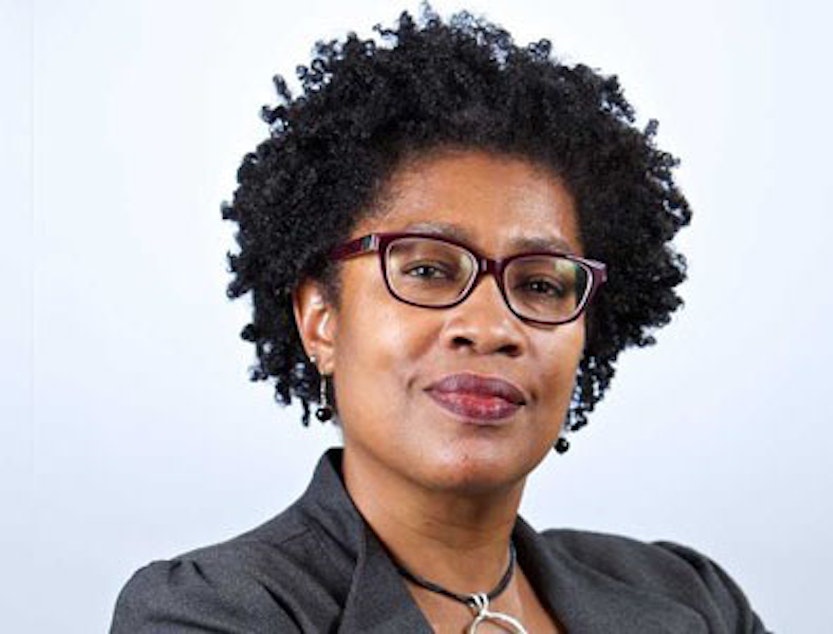A civil liberties perspective on protests against police killings

For the seventh day in a row, demonstrators are filling the streets of Seattle to protest police killings of Black people and demand police reform.
Michele Storms has been watching the protests very closely as police have used tear gas, flashbangs and pepper spray against protesters. She's the Executive Director of the ACLU of Washington.
She told me what's been going through her mind as the protests continue.
This interview has been edited for clarity.
As a person who leads a civil liberties organization, as a person who is a black person, I have so many emotions. I feel a lot of pain and grief over the loss of Black life and the lack of police accountability. So, I feel pride in the protest, but I also feel strongly a desire to have something new happen with regard to communities and policing.
Secondly, I look at how the police show up for protest in full-militarized gear with the flash bangs, and it hurts my heart, because it demonstrates the vast expanse between the average person, and how law enforcement shows up in acknowledgement of that protest.
Does it seem that there's been a different tone from law enforcement in these protests, compared to those of the past?
I don't know that I would say I've seen a difference in tone. I've been involved in a lot of protests in Seattle over many years, and many marches and rallies — from Mayday rallies to Martin Luther King Day rallies, and women's marches, and so forth. If anything, I feel like whenever rallies or marches are on certain topics, law enforcement will show up in a different way.
It did seem like law enforcement was prepared, with flashbangs and tear gas, for there to be unrest. It's not clear to me if the unrest would have happened absent the flashbangs and the tear gas and the militarized appearance. But I can't say for a fact how that would have been.
Earlier this week, you said that curfew orders could chill free speech. Now, city officials in Seattle have lifted the curfew after demands from activists.
I'm really glad that the curfew has been lifted, because I do firmly believe that the curfew does chill free speech. In particular, in this setting, the curfew was citywide, well beyond the parameters of where peaceful protests were happening.
Here we are protesting about the rights of Black and Brown people, and the excessive use of force that so frequently leads to death for Black and Brown people, then, when you put this curfew in place, it really emphasizes the fear.
It does chill free speech, because now, Black and Brown people who know that “innocent interaction to law enforcement can turn deadly” have even greater concern that an interaction with law enforcement will occur if they're out after curfew.
It doesn't actually stop protests from happening, but it does add to people's fear, and that's problematic. So, I'm really glad that it's gone.
The city of Seattle's policy says officers should not turn on body cameras during protests unless there is illegal activity going on. Some protesters have questions about whether body cams being turned off will lead to less transparency.
The issue of body cameras is really complex. What I feel community wants, and what we all want, is greater accountability for law enforcement. It's unclear whether body cameras actually achieve that.
Body cameras are outward facing, they face out to the public, and not to the officer. They pick up an awful lot of information other than just what's directly in front of that camera.
Until we have rules in place that are way more clear about when cameras should be on, and when they should be off — what rights people have to that footage, how the footage is used, how it's kept — it's going to continue to be a complicated issue.
Today is the seventh day of protests in Seattle. Thousands of people have taken to the streets each night. What is the most important thing you want people to know about their rights to protest?
I think the first thing is just that protest is a foundational right within democracy. It is really part of what helped democracy to form — people have the right to do that. People have the right to film their interactions with police, people have the right to organize, and people should do it freely.
I want, also, for people to think about, whether they're protesting or watching the protests, what happens next. How will we hear community concerns and ensure that those actually lead to the change that we need?
What happened to George Floyd, what happened to Eric Garner, Breonna Taylor, Charleena Lyles, so many people, is highly problematic and representative of generations of cultural norms that are harmful to Black and Brown people.
We need to be thinking about fighting on that front. We really need to remember the core issue that got all of this started. And, make sure that when the protesting is done, we're actually making change.
Listen to the interview by clicking the play button above.




